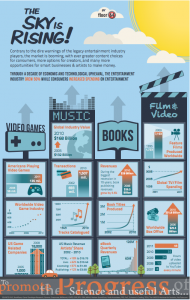Lady Gaga’s Manager Troy Carter: Piracy Is Going Away
Lady Gaga’s manager Troy Carter recently gave an excellent interview to Australia’s Brisbane Times, cited in today’s Digital Music News.
Carter and his client are embracing a lot of innovative mechanisms for connecting with and delivering content to fans—Gaga’s next album will be an app, and she has her own social network—and Carter’s advice should be heeded by his colleagues.
One particularly DisCo-relevant point was when Carter seemed to recognize the existence and impact of disruption, alluding to what Glenn had called in an early DisCo post “the poster child of disruption, buggy whip manufacturers”:
“People don’t buy horses to ride around any more for transportation. I just think the world changes. As a business, we have to make the proper adjustments.”
In this statement, Carter acknowledged that the expectations of consumers and competitors change, and that businesses are what have to adjust and adapt via competition and innovation, whether it be disruptive or incremental. This is exactly right. Rather than seeking protective regulations or other anticompetitive behaviors, businesses have to adjust to the reality of the world around them, and take advantage of the capabilities of technology, rather than fight them.
Carter also gave a statement that supports research in a report co-sponsored by CCIA, titled “The Sky Is Rising” [PDF]:
“The music industry is healthier than ever right now and it’s a fantastic time to be in it.”
The infographic on the first page of “The Sky Is Rising” shows how much the global industry value, transactions, and artists” shares have grown over this decade, and the data shows the vitality of this industry, thanks to new revenue streams and technological innovation. The context of this part of Carter’s interview was in recognizing the utility and potential of Internet-powered services and apps like Spotify, Pandora, and Rdio, particularly that they allow users to lawfully listen to music for free. He continued:
“I think piracy itself is going to end up going away. If you can get something for absolutely free [instead of] stealing it, and the quality of free is actually better than the quality of stealing it, the choice becomes easy.”
This is exactly right. The incentive to ‘pirate’ is reduced with the availability of lawful and convenient ways to consume content, whether it be affordable 99-cent songs on the iTunes platform, or free, ad-supported sites like Spotify. This interview is a refreshing antidote to rhetorical statements made in the context of proposed legislation like SOPA and PIPA that argued new laws were necessary because of ‘piracy.’ Whatever challenges are faced by the music industry—and as Carter’s insight and “The Sky Is Rising” demonstrate they may be limited—should be determined by competing in the market, rather than lobbying Congress. Many more artists and their representatives could follow the lead of Troy Carter and Lady Gaga, and take advantage of new technology.









